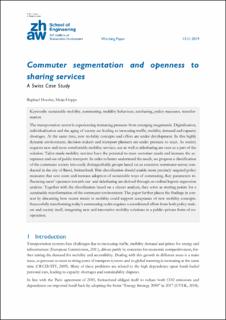Please use this identifier to cite or link to this item:
https://doi.org/10.21256/zhaw-18749| Publication type: | Working paper – expertise – study |
| Title: | Commuter segmentation and openness to sharing services : a Swiss case study |
| Authors: | Hoerler, Raphael Hoppe, Merja |
| et. al: | No |
| DOI: | 10.21256/zhaw-18749 |
| Extent: | 19 |
| Issue Date: | 13-Nov-2019 |
| Publisher / Ed. Institution: | ZHAW Zürcher Hochschule für Angewandte Wissenschaften |
| Publisher / Ed. Institution: | Winterthur |
| Language: | English |
| Subjects: | Sustainable mobility; Commuting; Mobility behaviour; Carsharing; Policy measures; Transformation |
| Subject (DDC): | 380: Transportation |
| Abstract: | The transportation sector is experiencing increasing pressure from emerging megatrends. Digitalisation, individualisation and the aging of society are leading to increasing traffic, mobility demand and capacity shortages. At the same time, new mobility concepts and offers are under development. In this highly dynamic environment, decision-makers and transport planners are under pressure to react. As society requests new and more comfortable mobility services, car-as well as ridesharing are seen as a part of the solution. Tailor-made mobility services have the potential to meet customer needs and increase the acceptance and use of public transport. In order to better understand the needs, we propose a classification of the commuter society into easily distinguishable groups based on an extensive commuter survey conducted in the city of Basel, Switzerland. This classification should enable more precisely targeted policy measures that save costs and increase adoption of sustainable ways of commuting. Key parameters influencing users’ openness towards car- and ridesharing are derived through an ordinal logistic regression analysis. Together with the classification based on a cluster analysis, they serve as starting points for a sustainable transformation of the commuter environment. The paper further places the findings in context by discussing how recent trends in mobility could support acceptance of new mobility concepts. Successfully transforming today’s commuting realm requires a coordinated effort from both policy-makers and society itself, integrating new and innovative mobility solutions in a public–private form of cooperation. |
| URI: | https://digitalcollection.zhaw.ch/handle/11475/18749 |
| License (according to publishing contract): | CC BY-NC-ND 4.0: Attribution - Non commercial - No derivatives 4.0 International |
| Departement: | School of Engineering |
| Organisational Unit: | Institute of Sustainable Development (INE) |
| Published as part of the ZHAW project: | Smart Commuting |
| Appears in collections: | Publikationen School of Engineering |
Files in This Item:
| File | Description | Size | Format | |
|---|---|---|---|---|
| 2019-11-13_Smart Commuting Working Paper Hoerler Hoppe.pdf | 732.06 kB | Adobe PDF |  View/Open |
Show full item record
Hoerler, R., & Hoppe, M. (2019). Commuter segmentation and openness to sharing services : a Swiss case study. ZHAW Zürcher Hochschule für Angewandte Wissenschaften. https://doi.org/10.21256/zhaw-18749
Hoerler, R. and Hoppe, M. (2019) Commuter segmentation and openness to sharing services : a Swiss case study. Winterthur: ZHAW Zürcher Hochschule für Angewandte Wissenschaften. Available at: https://doi.org/10.21256/zhaw-18749.
R. Hoerler and M. Hoppe, “Commuter segmentation and openness to sharing services : a Swiss case study,” ZHAW Zürcher Hochschule für Angewandte Wissenschaften, Winterthur, Nov. 2019. doi: 10.21256/zhaw-18749.
HOERLER, Raphael und Merja HOPPE, 2019. Commuter segmentation and openness to sharing services : a Swiss case study. Winterthur: ZHAW Zürcher Hochschule für Angewandte Wissenschaften
Hoerler, Raphael, and Merja Hoppe. 2019. “Commuter Segmentation and Openness to Sharing Services : A Swiss Case Study.” Winterthur: ZHAW Zürcher Hochschule für Angewandte Wissenschaften. https://doi.org/10.21256/zhaw-18749.
Hoerler, Raphael, and Merja Hoppe. Commuter Segmentation and Openness to Sharing Services : A Swiss Case Study. ZHAW Zürcher Hochschule für Angewandte Wissenschaften, 13 Nov. 2019, https://doi.org/10.21256/zhaw-18749.
Items in DSpace are protected by copyright, with all rights reserved, unless otherwise indicated.